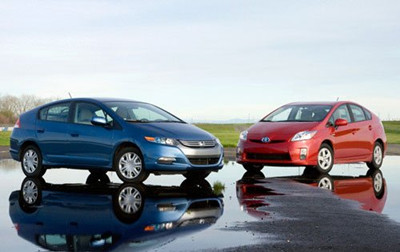日本的小廠商們正在與“要么大,要么死”這一條金科玉律抗?fàn)?/div>
ONE of the conundrums of the car business is that five smaller Japanese firms continue to prosper alongside three giants, Toyota, Nissan and Honda. In theory, those in the second division—Mazda, Mitsubishi, Suzuki and Subaru—should long ago have merged with rivals at home or abroad, or fallen by the wayside. Daihatsu is already controlled by Toyota, which has a 51% stake in the firm. They all sell 1m-2m vehicles a year. Sergio Marchionne, boss of Fiat Chrysler, once said that 6m was the minimum required for carmakers to have a hope of turning a profit.
目前,汽車產(chǎn)業(yè)里有著這樣一個(gè)費(fèi)解的情況:在三大巨頭(豐田Toyota、日產(chǎn)Nissan和本田Honda)的身旁,五家較小的日本公司能夠持續(xù)地取得出色業(yè)績。理論上來說,這些第二梯隊(duì)成員(馬自達(dá)Mazda、三菱Mitsubishi、鈴木Suzuki和斯巴魯Subaru)應(yīng)該早已被國內(nèi)或國外的對手所兼并,或是退出歷史長河。擁有大發(fā)汽車(Daihatsu)51%股權(quán)的豐田汽車公司,早已控制了前者的生產(chǎn)經(jīng)營。以上所提到的五家較小的制造商,他們每年各自約賣出100萬至200萬輛汽車。而菲亞特克萊斯勒(Fiat Chrysler)的老板Sergio Marchionne曾表示,對于汽車制造商來說,“600萬輛”是想要獲得盈利所必須達(dá)到的最低銷售總額。

The second-tier firms seem more determined than ever to disprove the notion that global scale and huge volumes are indispensable. Suzuki is a relative minnow with a strong presence in only one big market outside Japan—India. But not long ago it withdrew from an alliance with Germany's Volkswagen (VW), which could have helped it sell small and cheap vehicles in developed markets overseas.
這些第二梯隊(duì)公司似乎比以往任何時(shí)候都更有決心,去反駁這樣一個(gè)觀點(diǎn):業(yè)務(wù)規(guī)模和巨量銷售額都是不可或缺的。除去日本本土市場以外,鈴木汽車只在印度取得了耀眼的成績,相比于其他制造商來說十分不起眼。但就在不久之前,該公司退出了與德國大眾汽車(Volkswagen (VW))所結(jié)成的商業(yè)聯(lián)盟,而后者本應(yīng)該能幫助鈴木汽車進(jìn)入海外發(fā)達(dá)國家市場,以銷售旗下的小型廉價(jià)車輛。
Mazda, an even smaller firm, gladly parted ways with Ford. The American carmaker began to wind down its stake in 2008 to raise cash and avoid bankruptcy. The two firms had worked together since 1979. Subaru, part of Fuji Heavy Industries, a conglomerate, reportedly chafes at the 16.5% stake that Toyota, the world's biggest carmaker, holds in it. One obvious solution for the sub-scale firms—mergers with the biggest three—seems a distant prospect.
馬自達(dá)汽車,作為一家與鈴木相比規(guī)模更小的公司,欣然地脫離了福特汽車(Ford)的懷抱。為了籌措現(xiàn)金和避免破產(chǎn),福特汽車公司在2008年開始逐步拋售所擁有的馬自達(dá)汽車股份。這兩家公司從1979年開始就成為了合作伙伴。而與此同時(shí)據(jù)報(bào)道稱,作為富士重工(Fuji Heavy Industries)集團(tuán)的一份子,斯巴魯汽車正對豐田公司(全球最大的制造商)所擁有的該公司16.5%的股份表示不滿。對于與三大巨頭聯(lián)合的小規(guī)模制造商來說,那個(gè)“顯而易見”的脫困方案,現(xiàn)在反倒成了一份“遙遠(yuǎn)的期待”。
It helps that all are making generous profits after years of losses. A weaker currency means they are well-nigh printing money, notes Max Warburton of Sanford C. Bernstein, an equity-research firm. Subaru and Mazda, the biggest exporters among the five, are enjoying record sales in North America. Subaru now outsells VW there. The Japanese small-fry are also more profitable than most firms in the industry.
在長年累月的虧損期過后,目前這些制造商正賺著十分可觀的利潤,而這確實(shí)能讓他們緩一口氣。來自證券分析公司斯坦福·伯恩斯坦(Sanford C. Bernstein)的Max Warburton表示,日元的走弱差不多等同于日本車商正全力發(fā)動馬達(dá)印制鈔票。斯巴魯和馬自達(dá)是五家公司里出口貿(mào)易量最大的兩家,他們在北美市場的銷售量取得了紀(jì)錄新高。現(xiàn)在斯巴魯在當(dāng)?shù)氐匿N量還超過了德國大眾。同時(shí),這些日本第二梯隊(duì)成員的盈利狀況要比產(chǎn)業(yè)中大多數(shù)公司要好得多。
That may not last. A succession of lean years means the smaller firms lack cash to invest heavily in new technology. But they are finding smart ways to turn weaknesses into strengths. The industry admires Mazda's decision some years ago not to develop costly hybrid or fully electric powertrains in favour of pioneering its “SkyActiv” technology, which greatly improves the efficiency of petrol and diesel engines.
這些“好日子”或許不能持續(xù)太久。連續(xù)的市場不景氣,意味著較小的公司會缺乏現(xiàn)金對新技術(shù)的研發(fā)進(jìn)行大量投資。但他們找到了一條聰明的路,能夠?qū)⑷秉c(diǎn)轉(zhuǎn)化成優(yōu)點(diǎn)。目前,業(yè)界對馬自達(dá)數(shù)年前所做出的決定倍加推崇。馬自達(dá)公司沒有選擇去研發(fā)成本高昂的混合動力或純電動系統(tǒng),而是全力開發(fā)已有的“創(chuàng)馳藍(lán)天(SkyActiv)”技術(shù)。這一技術(shù)能夠極大地提高汽油機(jī)和柴油機(jī)的工作效率。
SkyActiv is typically pragmatic engineering from the Japanese, and just what the market wants now, says Mr Warburton. In the coming years, however, meeting tighter emissions standards will require more capital spending. It may also be difficult for the smaller firms to invest in technologies that support autonomous driving, should it prove popular.
Warburton先生表示,“創(chuàng)馳藍(lán)天”技術(shù)是來自日本“務(wù)實(shí)”工程的典范,這正是目前市場所需要的東西。然而,為了在未來數(shù)年應(yīng)對日漸嚴(yán)苛的廢氣排放標(biāo)準(zhǔn),加大研發(fā)資本的投入勢在必行。與此同時(shí),對于較小的制造商而言,想要投資于能夠支持自動駕駛系統(tǒng)的車輛也是一件困難的事情,而自動駕駛系統(tǒng)應(yīng)該會成為十分受歡迎的技術(shù)之一。
Another explanation for the small firms' endurance is the tacit support of Japan's government. In the case of Suzuki, Mitsubishi and Daihatsu this support is visible in the form of longstanding tax breaks to miniature “kei” cars. Much loved by women and the old, the tiny cars and trucks now account for around two-fifths of new-vehicle sales in Japan. Nissan and Honda manufacture kei cars, but the three smaller makers rely on them more.
對于小公司能夠堅(jiān)持至今的另一種解釋,就是他們接受了來自日本政府的隱性支持。就鈴木、三菱和大發(fā)三家廠商來說,政府的支持是擺在臺面的,他們都在微型“輕型”車的生產(chǎn)銷售方面享受到了長期的稅收減免優(yōu)惠。“輕型”車受到廣大女性群體和長者們的歡迎,目前這些迷你轎車和迷你貨車的銷售量已經(jīng)占了日本新車市場的五分之二。雖然日產(chǎn)和本田也在生產(chǎn)“輕型”車,但那較小的三家制造商要比兩大巨頭更為依賴“輕型”車。
The government now seems to have heeded the warnings of the largest carmakers, that making kei cars diverts attention and funds from the development of models with export potential. A decision earlier this year to raise taxes on the category bodes ill for their manufacturers. While Subaru and Mazda are successful outside Japan, and Suzuki is envied for making big profits selling small cars, the weakest of the second tier may soon face fresh difficulties.
現(xiàn)在,日本政府似乎已經(jīng)注意到了汽車巨頭們的警告,后者認(rèn)為大力制造“輕型”車,會減少在其他具有出口潛力車型的開發(fā)方面所需的精力和資金投入。今年早些時(shí)候日本政府決定提高“輕型”車的稅率,這也預(yù)示著生產(chǎn)該車型的廠商前景趨于黯淡。當(dāng)斯巴魯和馬自達(dá)在海外市場大獲成功之時(shí),鈴木汽車旗下“輕型”車的巨額利潤也同樣令人眼紅。然而,這第二梯隊(duì)里最弱的一家制造商或許馬上就要面臨新的困難。
The underlying problem faced by all Japan's carmakers is a declining and largely unprofitable home market, says John Harris, a consultant. Yet for Mitsubishi, probably the weakest of the five, the problem is eased by support from the huge industrial group it belongs to and Daihatsu will continue to enjoy Toyota's protection. With this level of help it is unsurprising that none of the small carmakers has yet run off the road.
咨詢師約翰·哈里斯(John Harris)表示,全日本的汽車制造商都有著一個(gè)共同的潛在問題,那就是持續(xù)萎縮和基本上無利可圖的國內(nèi)市場。然而,就三菱汽車而言,這家?guī)缀跏俏寮夜緦?shí)力最弱的成員,一直從自己所屬的巨型集團(tuán)當(dāng)中得到支持。大發(fā)汽車也將持續(xù)地受到豐田的保護(hù)。在這種程度的幫助之下,我們就不難預(yù)測到,這批小型制造商都會“活得好好的”。譯者:顏士竣












